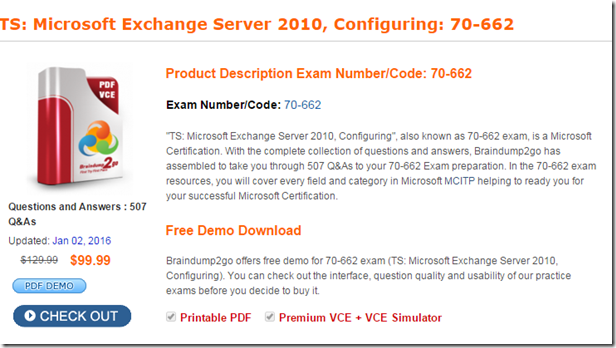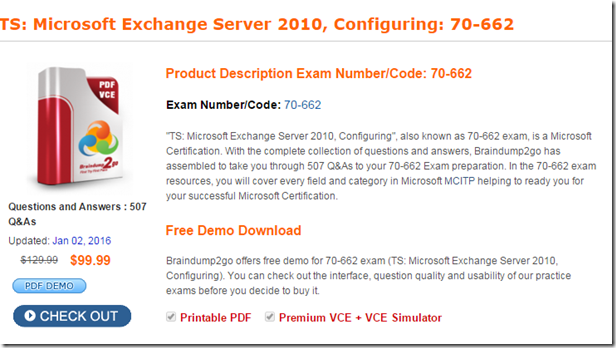18 01 2016
Free Braindump2go 70-662 Book PDF And 70-662 Braindumps Help 70-662 Certification Exam 100% Success (301-310)
MICROSOFT NEWS: 70-662 Exam Questions has been Updated Today! Get Latest 70-662 VCE and 70-662 PDF Instantly! Welcome to Download the Newest Braindump2go 70-662 VCE&70-662 PDF Dumps: http://www.braindump2go.com/70-662.html (507 Q&As)
Microsoft Official Exam Center New Released 70-662 Dumps Questions, Many New Questions added into it! Braindump2go Offer Free Sample Questions and Answers for Download Now! Visit Our Webiste, get the new updated Questions then pass Microsoft 70-662 at the first try!
Exam Code: 70-662
Exam Name TS: Microsoft Exchange Server 2010, Configuring
Certification Provider: Microsoft
Corresponding Certifications: MCITP, MCITP: Enterprise Messaging Administrator on Exchange 2010, MCTS, MCTS: Microsoft Exchange Server 2010, Configuring
70-662 Dumps,70-662 PDF,70-662 PDF eBook,70-662 Braindump,70-662 Study Guide,70-662 Book,70-662 Practice Test,70-662 Dumps PDF,70-662 VCE,70-662 VCE Dumps,70-662 Valid Dumps,70-662 Exam Questions Free,70-662 Dumps,70-662 Free Dumps,70-662 Questions and Answers Free,70-662 Braindump PDF,70-662 Braindump VCE,70-662 Preparation

QUESTION 301
You have an Exchange Server 2010 Service Pack 1 (SP1) organization.
The organization contains a Hub Transport server named Server1 and an Edge Transport server named Server2.
All servers are configured to use an internal DNS server named DNS1 for host name resolution. You configure an Edge Subscription from Server1 to Server2.
You need to modify the delayed acknowledgment (ACK) settings of Server2.
What should you do?
A. From the Exchange Management Console (EMC), disable the IP Block List feature.
B. From the Exchange Management Console (EMC), modify the properties of the accepted
domain.
C. From the Exchange Management Shell, run the Set-ReceiveConnector cmdlet.
D. From the Exchange Management Shell, run the Set-TransportConfig cmdlet.
E. From the Exchange Management Shell, run the Set-TransportServer cmdlet.
F. From the Exchange Management Console (EMC), modify the properties of the remote
domain.
G. From the Exchange Management Console (EMC), create a transport rule.
H. From the Exchange Management Shell, run the Set-TransportAgent cmdlet.
Answer: C
Explanation:
http://technet.microsoft.com/en-us/library/hh529935.aspx
QUESTION 302
You have an Exchange Server 2010 Service Pack 1 (SP1) organization.
The organization contains a Hub Transport server named Server1 and an Edge Transport server named Server2.
All servers are configured to use an internal DNS server named DNS1 for host name resolution. You configure an Edge Subscription from Server1 to Server2.
You discover that Server1 responds to SMTP requests by using the serverl.contoso.com fully qualified domain name (FQDN).
You need to ensure that Server1 responds to the SMTP requests by using the mail.contoso.com FQDN.
What should you do?
A. From the Exchange Management Shell, run the Set-TransportAgent cmdlet.
B. From the Exchange Management Shell, run the Set-TransportServer cmdlet.
C. From the Exchange Management Shell, run the Set-ReceiveConnector cmdlet.
D. From the Exchange Management Console (EMC), modify the properties of the remote
domain.
E. From the Exchange Management Console (EMC), create a transport rule.
F. From the Exchange Management Console (EMC), disable the IP Block List feature.
G. From the Exchange Management Console (EMC), modify the properties of the accepted
domain.
H. From the Exchange Management Shell, run the Set-TransportConfig cmdlet.
Answer: B
QUESTION 303
Your network contains an Active Directory forest named fabrikam.com.
The organization contains Exchange Server 2010 Service Pack 1 (SP1)
All client computers run Microsoft Office Outlook 2003.
A server named Ex1 hosts all public folders.
You upgrade all of the client computers to Outlook 2010.
You need to remove all of the public folders from Ex1.
What should you do first?
A. Delete all of the public folders from the public folder database
B. Modify the offline address book (OAB) distribution settings.
C. Modify the properties of the mailbox database.
D. Perform an offline defragmentation of the public folder database files.
Answer: A
Explanation:
In the console tree, click Toolbox.
In the result pane, click Public Folder Management Console.
In the action pane, click Open Tool. The Public Folder Management Console appears.
In the console tree, expand Default Public Folders, and then select the parent public folder of the public folder that you want to remove.
In the result pane, select the public folder that you want to remove.
In the action pane, click Remove. A warning appears. Click Yes to confirm that you want to remove the public folder.
http://technet.microsoft.com/en-us/library/aa997202.aspx
QUESTION 304
Your network contains an Active Directory forest named fabrikam.com.
The forest contains an Exchange Server 2010 Service Pack 1 (SP1) organization.
You have an internal network and a perimeter network.
The internal network and the perimeter network are separated by a firewall.
The network contains the servers configured as shown in the following table.
You need to configure the firewall that separates the internal network and the perimeter network. The configuration must meet the following requirements:
– Ensure that inbound email messages can be relayed to Hub1.
– Ensure that outbound email messages can be relayed to Edge1.
– Ensure that the list of Exchange recipients is replicated to Edge1.
Which TCP ports should you open on the firewall?
![image_thumb[10] image_thumb[10]](http://examgod.com/bdimages/2548c5bcb121_8719/image_thumb10_thumb.png)
A. Outbound ports 25, 443, and 50636 from the internal network to the perimeter network.
Inbound port 443 from the perimeter network to the internal network.
B. Outbound ports 25 and 443 from the internal network to the perimeter network.
Inbound ports 25 and 636 from the perimeter network to the internal network.
C. Outbound port 25 from the internal network to the perimeter network.
Inbound port 389 from the perimeter network to the internal network.
D. Outbound ports 25 and 50636 from the internal network to the perimeter network.
Inbound port 25 from the perimeter network to the internal network.
Answer: D
QUESTION 305
Your network contains an Active Directory domain named contoso.com.
You have an Exchange Server 2010 Service Pack 1 (SP1) organization.
External users access their email by using Outlook Web App.
You need to ensure that the external users can log on to Outlook Web App without specifying a domain name.
Which cmdlet should you use?
A. New-OwaMailboxPolicy
B. Set-OwaVirtualDirectory
C. Set-OrganizationConfig
D. New-OrganizationRelationship
Answer: B
Explanation:
Set-OWAVirtualDirectory-Identity “owa (default web site)”-LogonFormat username-DefaultDomain www.contoso.com
QUESTION 306
Your network contains an Exchange Server 2010 Service Pack 1 (SP1) organization.
All users access their mailbox by using Microsoft Outlook 2010.
You need to modify the internal host name for Outlook Anywhere.
What should you do?
A. Run the New-ActiveSyncMailboxPolicy cmdlet.
B. Modify the properties of the Mailbox server object.
C. Modify the properties of the Client Access server object.
D. Run the Set-ImapSettings cmdlet.
Answer: C
QUESTION 307
You have an Exchange Server 2010 Service Pack 1 (SP1) organization named contoso.com.
All users access their mailbox by using Microsoft Outlook 2010.
You need to ensure that the users can prevent sensitive email messages from being forwarded to other recipients.
What should you first?
A. Run the Set-TransportConfig cmdlet.
B. Configure Transport Layer Security (TLS) on all Send connectors.
C. Install Active Directory Rights Management Services (AD RMS).
D. Deploy Secure MIME.
Answer: C
Explanation:
http://technet.microsoft.com/en-us/library/dd302432.aspx
http://technet.microsoft.com/en-us/library/dd351035
QUESTION 308
Your network contains an Active Directory domain.
The domain contains one site.
You have an Exchange Server 2010 Service Pack 1 (SP1) organization that contains two Client Access servers, two Hub Transport servers, and three Mailbox servers.
The mailbox servers are members of a database availability group (DAG) named DAG1.
An administrator adds a sender policy framework (SPF) record for your company.
You need to verify that the SPF record is configured correctly.
What should you run from the Exchange Management Shell?
A. Test-MailFlow
B. Test-SenderId
C. Test-ReplicationHealth
D. checkdatabaseredundancy.psl
E. Get-MailboxDataboxCopyStatus
F. Get-SenderIdConfig
G. Test-SystemHealth
H. Get-MailboxDatabase
I. Test-SmtpConnectivity
J. Test-MapiConnectivity
K. Test-AvailabilityService
L. Retry-Queue
M. Test-WebServicesConnectivity
N. Test-OutlookWebServices
Answer: B
QUESTION 309
Your network contains an Active Directory domain.
The domain contains one site.
You have an Exchange Server 2010 Service Pack 1 (SP1) organization that contains two Client Access servers, two Hub Transport servers, and three Mailbox servers.
The mailbox servers are members of a database availability group (DAG) named DAG1.
Some users report that they cannot access their mailbox by using Outlook Anywhere.
You verify that the issue only occurs when the users connect to one of the Client Access servers. You need to identify the configuration error on the Client Access server.
What should you run from the Exchange Management Shell?
A. Get-SenderIDConfig
B. Test-SenderId
C. Get-MailboxDatabase
D. Test-SmtpConnectivity
E. Test-SystemHealth
F. Test-AvailabilityService
G. Retry-Queue
H. Test-MailFlow
I. Test-ReplicationHealth
J. Test-WebServicesConnectivity
K. Test-OutlookWebServices
L. Get-MailboxDatabaseCopyStatus
M. checkdatabaseredundancy.ps1
N. Test -MapiConnectivity
Answer: J
QUESTION 310
Your network contains an Exchange Server 2010 Service Pack 1 (SP1) organization named fabrikam.com.
A user named User1 is a member of the legal department.
You need to provide User1 with the ability to search for mailbox content in multiple mailboxes. Which Windows PowerShell cmdlet should you use?
A. New-ManagementRoleAssignment
B. New-ManagementRole
C. New-ManagementRoleEntry
D. Add-MailboxPermission
Answer: A
Want to be 70-662 certified? Using Braindump2go New Released 70-662 Exam Dumps Now! We Promise you a 100% Success Passing Exam 70-662 Or We will return your money back instantly!

FREE DOWNLOAD: NEW UPDATED 70-662 PDF Dumps &70-662 VCE Dumps from Braindump2go: http://www.braindump2go.com/70-662.html 507 Q&As)
[Braindump2go] 70-662 Exam Prep Free Download (291-300) Study Latest Braindump2go 70-662 Practice Exam Questions From Today Pass 70-662 Easily! (311-320)
Comments are currently closed.